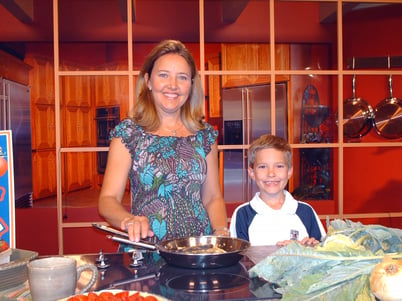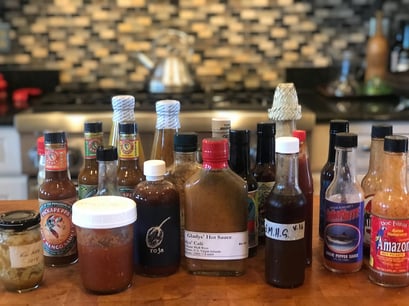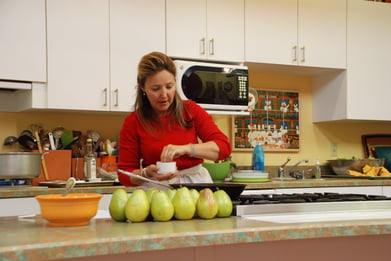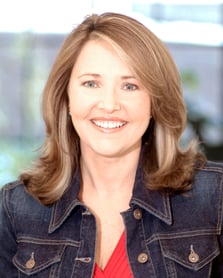What inspired you to become an entrepreneur?
That’s an interesting question. I don’t know if there was a moment of “inspiration.” As a kid I was always playing and pretending I had a business so there must be something about that! :-) But really, at heart, I see myself more of a problem-solver than an “entrepreneur”, comfortable with chaos and uncertainty. So, I suppose I’ve always been attracted to opportunities to jump in to uncertain situations, where the problems are somewhat wicked or undefined. In doing so, I’ve been in jobs working for someone else where I’ve had opportunities to be innovative/entrepreneurial and play a part in solving some really wicked problems; I’ve worked in and with start-ups across many industries and sectors; and I’ve taken the step to start my own businesses when I’ve seen a problem worth solving. So, while it wasn’t a moment of inspiration to become an entrepreneur, it was certainly a journey... and a mindset.

Me in-studio at KDKA during my Local Goodness series on Pittsburgh Today Live. This particular day I had my son with me on camera as we talked about spring seasonal foods and demonstrated recipes that are fun for kids to help make...and enjoy.
What can large corporations learn from startups?
First, this is a complex question to answer. But in some respects it’s really about thinking about the business and its opportunities from a different perspective and to intentionally think innovatively and entrepreneurially. This alone carries a lot of meaning to unpack (and not even all startups think innovatively)!
It may be a gross oversimplification, but to me (as a problem-solver) it’s about looking at the world (the market) from this problem-solving point of view. What are the problems in the market today that haven’t yet been ideally solved? How can we as a company solve these problems in a more meaningful and valuable way for customers? What NEW markets can we create by thinking innovatively, versus trying to figure out what share of our existing market can we simply take away from our competitors? This starts by looking at new business opportunities through the lens of the “customer” vs. the lens of what the business wants to do or what we can simply create. Not “we’ve got X product or capability, who is the customer who would want this, how do we best market and sell to them?”, but rather “who’s trying to accomplish Y, is this a big enough challenge to try to address, and what can we do to capture that opportunity to solve Y’s problem or need?”
This involves stepping outside of your own ego (as an individual or a company) to become a curious seeker, not loving your idea or product first, but finding and falling in love with the problem worth solving. This is not easy... for an entrepreneur or for a corporation... but this is why so many startups and even new products fail. We create something because we can. We have the talent, the resources, we BELIEVE someone will want it, but we don’t take the time to find out if anyone (or enough people) want what we’ve created. This often fails... but when we find the problem worth solving and understand it well - through the perspective of the customer - we have a much greater chance of creating something that someone really wants. We have to jump into the market first to gain this type of understanding before building our product or service, not after to learn whether we got it right or not.
What is one fun or interesting thing that students should know about you?
Hmmm... well, another hard question :-). Feels a little strange to think of something others would find interesting. But most people tell me they’re most interested in and curious about my diverse and eclectic career and how it’s gotten me to what I do now. How does a former restaurateur with an MBA, who ran a non-profit, directed a regional economic revitalization initiative, joined a bioinformatics startup, started (and still runs) a consulting practice, is a food writer and cooking instructor who created a multi-media local food and artisan company, and works with, advises, and coaches innovators and entrepreneurs get there? Good question. I have had a lot of experiences. And while it may appear to be a winding road, every experience led to another, and it’s the willingness to step into the unknown when opportunities are presented that has been, for me, the most interesting (and rewarding).
On a different tangent, I’m a pepper head and collect hot sauces. We also make our own varieties from a large variety of hot peppers we grow in our garden. I’ll find any opportunity to spice up a meal — breakfast, lunch or dinner — with the perfect hot sauce “pairing”.
To calm the heat, I also collect local honey from the places I’ve traveled to!

A sampling of my hot sauce collection :-) from travels ... and along with some of our homemade hot sauces.
What was the best business advice that you’ve received? That you’ve given?
From an entrepreneurial perspective, one of the best pieces of advice I’ve received was from an advisor about an idea that had been bubbling up over a few years. I felt I knew the challenges, I knew the customers, I knew what was and wasn’t out there in the market, I had an idea of a solution and I wondered if I should do it. Their advice was, “give it a shot!” It doesn’t take much to test the idea, get SOMETHING out there and find out. I wanted to get everything perfect first... and that’s a fatal flaw. You have to get SOMETHING out there to test the market... then you learn and know if it may be worth making perfect for the customers.
I really wouldn’t know the best advice I’ve given (that’s up to others to determine!), but the advice I give often relates to a lot of what I’ve said already; that is to know and I mean REALLY get to know the problem you are trying to solve from the people who have that problem. Don’t guess... you have to put yourself out there and talk with them, learn from them, observe, dig and understand their point of view on what they’re trying to do, what they’re trying to accomplish, what their greatest challenges are, what they try to do to solve them, and what works for them and what doesn’t. When you become curious and put yourself in this discovery and learning mode, you start to uncover so many gems — and gems that others don’t bother to uncover — that help you identify opportunities to be an innovative problem-solver. The entrepreneurial part is what you then do about it!
What was your biggest “a-ha” moment?
One “a-ha” moment that is still with me to this day was when another person I know wanted to start a company and asked if I’d be interested in working with him on an idea. He had several general ideas and we decided on one. Before we began to create anything, we struck out to figure out who we needed to talk to to learn more about the idea we had. (This will start to sound familiar). We had identified (we thought) the people who would be interested in the challenge or problem we perceived. To make a long story short, over the course of about 2 1/2 months we talked with probably 65 people in the space. We weren’t selling them on an idea... or even sharing our idea and trying to get their reaction. Rather we wanted to know their experiences around the general problem we perceived. We quickly found out who was and wasn’t our target, and we pretty quickly learned about a real problem that they couldn’t figure out how to solve and we could then explore what ideal solutions would look like. We began to get a crystal clear picture, and in the process of exploration we were building excited potential customers. They were so excited, in fact, that as we would go back to them with a concept based on our conversations they were asking US if they could be alpha customers as we began to build the solution out — and pay us!! WOW!!
This experience is emblazoned in my core beliefs. I learned the power of “customer discovery” well before the concept would be coined and made wildly popular years later by Steve Blank and it influences much of what I do today in business or anything else about serving others.
Does it mean that a business will absolutely be successful with this insight and customer eagerness? No, there are myriad variables that determine success. But it does give you far more confidence to take that first and next and next and next step in creating and starting a business because you KNOW what your customers want... because they’ve told you and have been part of helping design THEIR solution.
If you could have dinner with anyone, who would it be and why?
Any other time this would be a playful question. But right now in this crazy, shelter-at-home, quarantined world we’re all in, those I would want to have dinner with the most are (along with my husband and son) are the family members I can’t be with until it’s safe — my parents, brother, in-laws, nieces and nephews — hugging each other as we gather, sitting close together around a big table, laughing, sharing stories and savoring every moment!

Me during one of my cooking classes years ago.
 Rhonda is an entrepreneur and seasoned professional experienced in driving customer-focused, purpose-centric strategy and innovation, especially in complex environments. She is the founder and President of The Synergos Group LLC, a boutique firm providing business and strategic consulting for early stage and evolving organizations across multiple industries and sectors. As an early advocate and subject matter expert on the “local” movement, Rhonda created Local Goodness, a multi-media firm that most recently launched the Local Goodness Marketplace, a website dedicated to offering all the best of all things local. Rhonda serves as the Innovation Coordinator for The Pennsylvania State University in New Kensington, where she develops and delivers innovation and entrepreneurial programming on campus and at The Corner, a co-working and entrepreneur/small business support space anchoring the Corridor of Innovation in downtown New Kensington.
Rhonda is an entrepreneur and seasoned professional experienced in driving customer-focused, purpose-centric strategy and innovation, especially in complex environments. She is the founder and President of The Synergos Group LLC, a boutique firm providing business and strategic consulting for early stage and evolving organizations across multiple industries and sectors. As an early advocate and subject matter expert on the “local” movement, Rhonda created Local Goodness, a multi-media firm that most recently launched the Local Goodness Marketplace, a website dedicated to offering all the best of all things local. Rhonda serves as the Innovation Coordinator for The Pennsylvania State University in New Kensington, where she develops and delivers innovation and entrepreneurial programming on campus and at The Corner, a co-working and entrepreneur/small business support space anchoring the Corridor of Innovation in downtown New Kensington.
Get in touch with Rhonda here.